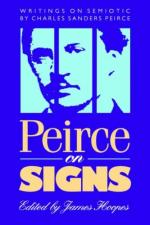|
This section contains 7,113 words (approx. 24 pages at 300 words per page) |

|
SOURCE: "The Origin and Development of Peirce's Concept of Self-Control," in Transactions of the Charles S. Peirce Society, Vol. XXVIII, No. 4, Fall, 1992, pp. 667-90.
In the following excerpt, Perry examines the concept of self-control in Peirce's philosophy, finding it derives from Peirce's reading of Friedrich Schiller, Henry James, and Emmanuel Swedenborg.
The phenomenon of self-control, as described by Peirce, is "common to all grown men and women" (5.442). Its role in Peirce's philosophy, however, is anything but common. After the turn of the century it became a remarkably complex and central theme in his writings. Peirce based his theory of pragmaticism on a study of the phenomenon of self-control (5.442), it became a defining characteristic of his Logic and Ethics (1.191) and it is the modus operandi for evolution, at least "in its higher stages" (5.433). Perhaps because of its importance, Peirce called for "a review of the process of self-control in...
|
This section contains 7,113 words (approx. 24 pages at 300 words per page) |

|


